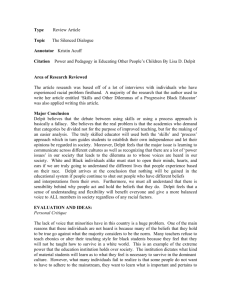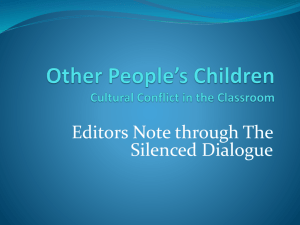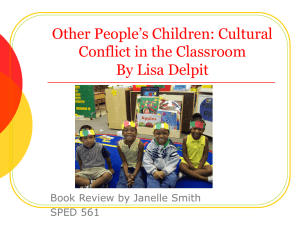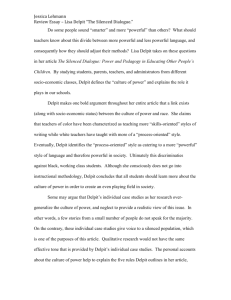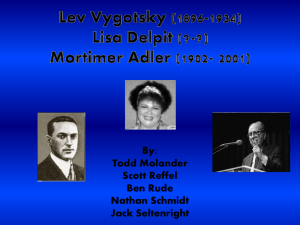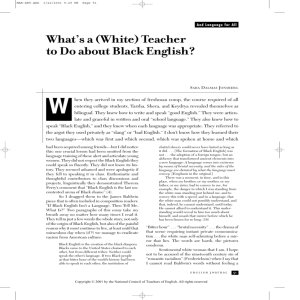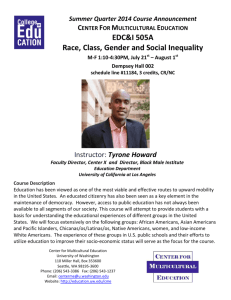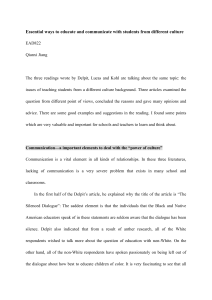Looking to the Future
advertisement
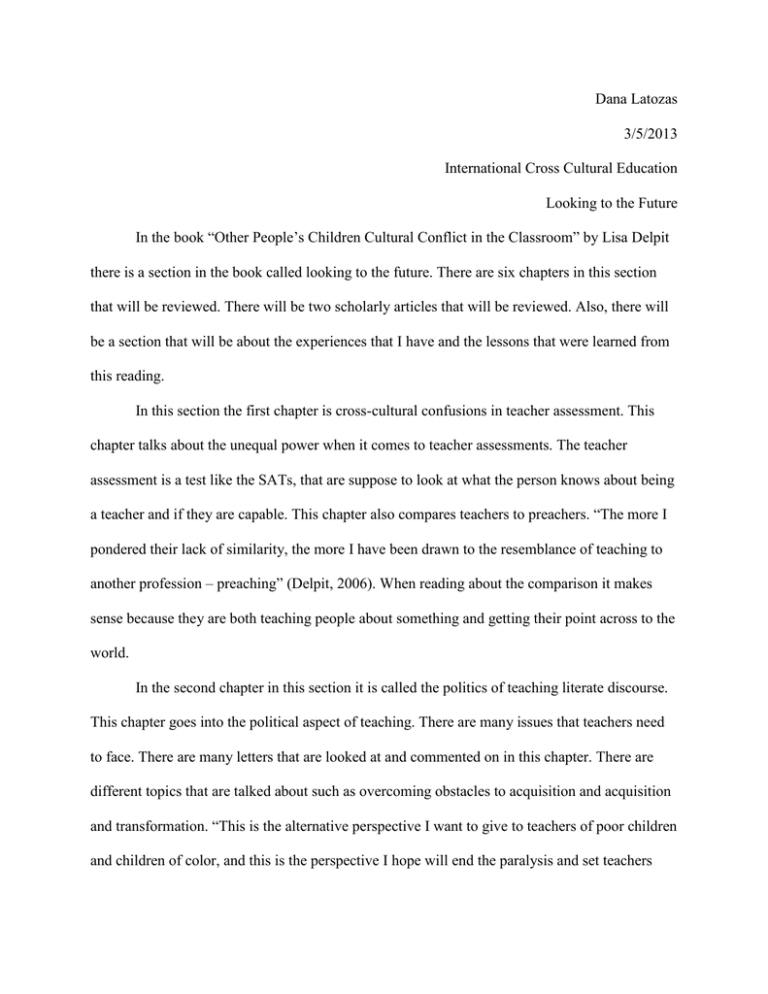
Dana Latozas 3/5/2013 International Cross Cultural Education Looking to the Future In the book “Other People’s Children Cultural Conflict in the Classroom” by Lisa Delpit there is a section in the book called looking to the future. There are six chapters in this section that will be reviewed. There will be two scholarly articles that will be reviewed. Also, there will be a section that will be about the experiences that I have and the lessons that were learned from this reading. In this section the first chapter is cross-cultural confusions in teacher assessment. This chapter talks about the unequal power when it comes to teacher assessments. The teacher assessment is a test like the SATs, that are suppose to look at what the person knows about being a teacher and if they are capable. This chapter also compares teachers to preachers. “The more I pondered their lack of similarity, the more I have been drawn to the resemblance of teaching to another profession – preaching” (Delpit, 2006). When reading about the comparison it makes sense because they are both teaching people about something and getting their point across to the world. In the second chapter in this section it is called the politics of teaching literate discourse. This chapter goes into the political aspect of teaching. There are many issues that teachers need to face. There are many letters that are looked at and commented on in this chapter. There are different topics that are talked about such as overcoming obstacles to acquisition and acquisition and transformation. “This is the alternative perspective I want to give to teachers of poor children and children of color, and this is the perspective I hope will end the paralysis and set teachers free to teach, and thereby to liberate” (Delpit, 2006). She wants to reshape the system for teachers to have some freedom when it comes to teaching and their styles of teaching. In the third chapter it is called education in a multicultural society: out future’s greatest challenge. This chapter goes into the cultural aspects in education. There are clashes with students and the school. There is always stereotyping with students. Assumptions are made when a teacher thinks that a student has a problem or a disability. In the community people are ignorant because they are use to how things are in the community and do not take change very well. People do not always see the problems or the aspects that are hurting us in the long road. There needs to be problems that are assessed and evaluated when it comes to education in a cultural community. “I pray for all of us the strength to teach our children what they must learn, and the humility and wisdom to learn from them so that we might better teach” (Delpit, 2006). There are always lessons that could be learned from children. Children are usually not as judgmental towards others and pick up on things that adults do not pick up on. Adults can learn some lessons from children. In the fourth chapter it is called “Reflections on Other People’s Children” by Herbert Kohl. This chapter just gives the views that this person sees when it comes to reading the book and having his own ideas. “Lisa’s work is about the complex intersection of theory and effective practice that I have been concerned with for years” (Delpit, 2006). He has the same concerns as the author about education and the students being taught. He feels strongly about this like the author. He gives his own opinion on the book and looks at the different views that can be taken from the book, like white people versus blacks would view this book differently. In the fifth chapter it is called “Teaching the Hard of the Head” by Charles M. Payne. This chapter goes into the experiences that he experienced as a first year teacher. He goes into the feelings that he faced during his experiences and how some of his other colleagues did not have the same views as him. “When I ask, as I always do in these conversations, in what ways going to an elite university might have been a disadvantage for someone who wants to work in the inner city, what trained incapacities could result, this student actually tries to think about the question” (Delpit, 2006). This is showing people that not everyone knows what exactly to do with going into a career and how to take the information and use it. There needs to be an understanding of what the person wants to do with their life to be successful and to continue their education. The sixth chapter is called “Other People’s Children the Lasting Impact” by Patricia Lesesne. This chapter goes into the experiences that this person has faced and what was learned from this book. “Other People’s Children has deeply affected my teaching practice and my ways of being in our school community” (Delpit, 2006). This shows that this person learned from reading this book and now looks at her job and how to do it differently and how to be better in the school community. This person goes into what she has done with teaching and how it has changed from reading this book. In the article “Understanding the Power of Words in Multicultural Education” by Festus Obiakor, Darren Smith, and Marty Sapp, this article talks about how the world is changing and there are more cultures coming to the U.S. that need to be addressed. It looks at ways to increase multicultural education in schools and the communities. It talks about how language is a barrier. “As it appears, our paradigms and powers seem to be shifting, and it is no longer necessary to master conventional English in order to make it ‘big’ in this world” (Obiakor, Smith, & Sapp, 2007). This shows that the world is changing and how in schools they focus on making sure students speak English well, this is showing that this should not be focused on as much because you can still become successful without the proper speaking of English. In the article “Descriptions of Dispositions for Assessment in Pre-Service Teacher Education Field Experiences” by Pattie Johnston, Gina Almerico, Deanna Henriott, and Mykel Shapiro, this article talks about looking at the experiences that field internships have and the assessments of the performance. “Researchers strived to develop a greater understanding of dispositions being assessed in teacher field education programs by identifying descriptors which clearly focus on the conceptual meaning of a given disposition” (Johnston, Almerico, Henriott, &Shapiro, 2011). This is showing that there is research into the assessments of experiences of field education. Some people could have bad experiences and some people may not know how to assess other people. These assessments need to be looked at further and researched to see if they are doing the best job and if there is a different way to assess someone. The experience, professional, and social change that I got from the reading is that there are many issues in our education when it comes to people that are not white and have different cultures. There is still discrimination and it is shown in this book with education, teachers, and students. There are many people that have experienced the issues and who feel the same as the author as this book. This shows that it is not just one person who recognizes this and that there really is an issue with our education. This makes me think about how I treat people with social and professional aspects. I know that I need to make sure that I do not judge anyone and listen to what others have to say. Everyone is different and we need to get people to understand that not everyone is the same. Just because someone is different from someone else does not mean that they should be treated differently. This needs to get into people’s heads and needs to be addressed. A good way to address this is in school to have the students learn about this and the teachers understand this and not be judgmental. Education needs to start evolving with the world. Reference Delpit, Lisa (2006). Other People’s Children: Cultural Conflict in the Classroom. New York: The New Press. Johnston, P., Almerico, G. M., Henriott, D., & Shapiro, M. (2011). DESCRIPTIONS OF DISPOSITIONS FOR ASSESSMENT IN PRE-SERVICE TEACHER EDUCATION FIELD EXPERIENCES. Education, 132(2), 391-401. Obiakor, F. E., Smith, D. J., & Sapp, M. (2007). PART III: CREATING MULTICULTURAL CLASSROOMS: Understanding the Power of Words in Multicultural Education. Multicultural Perspectives, 9(2), 36-42. doi:10.1080/15210960701386392
